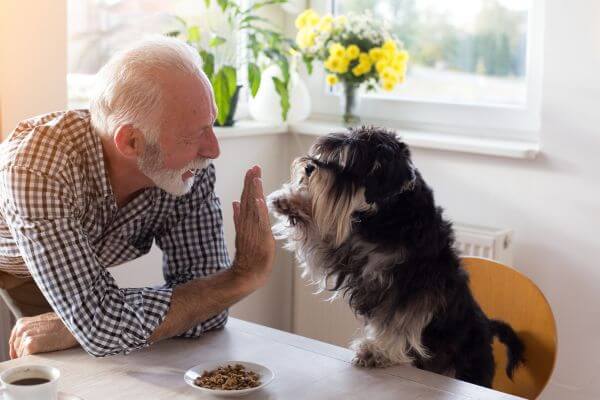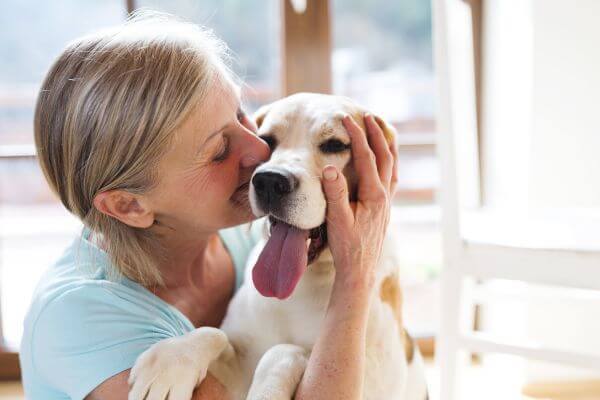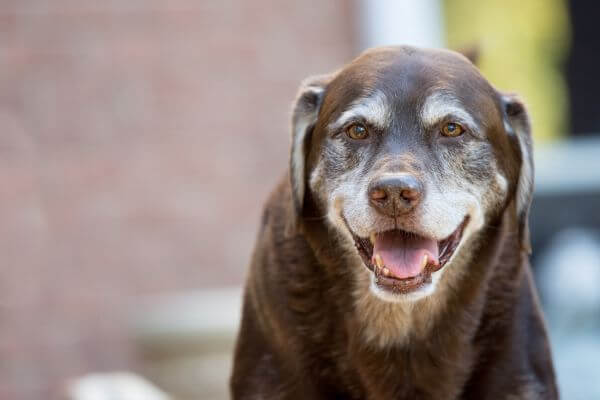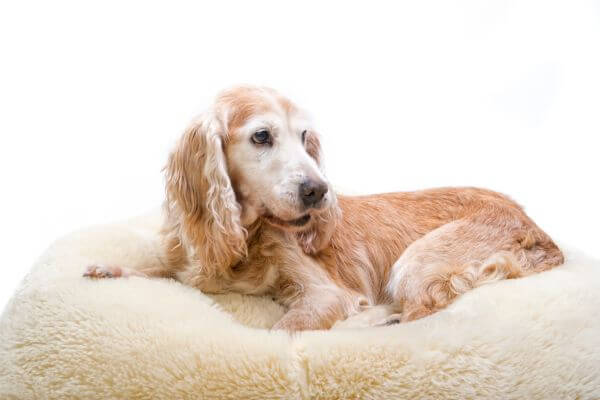When caring for our faithful four-legged friends, nutrition plays a vital role in their health and well-being, especially as they age. In this article, we will explore how to provide proper nutrition for elderly dogs, ensuring they enjoy a full and happy life.
Essential Nutrition for Longevity

As our dogs age, their nutritional needs change. It is crucial to adapt their diets to ensure they receive the necessary nutrients to support their health and vitality. A balanced and personalized diet can help prevent age-related diseases and promote a long and active life for our furry friends.
However, finding the ideal diet for elderly dogs can be challenging. It is important to consider factors such as age, size, weight, and overall health of the dog when planning their nutrition. Additionally, regular consultations with a veterinarian are essential to ensure their specific needs are met.
When addressing nutrition for elderly dogs, we should prioritize foods rich in high-quality proteins, vitamins, and essential minerals. Opt for foods formulated specifically for elderly dogs, which often contain adequate levels of protein to maintain muscle mass and promote joint health.
Additionally, consider nutritional supplements such as omega-3 fatty acids, which can benefit skin and coat health, as well as promote heart and joint health. Always remember to provide fresh and clean water to ensure proper hydration.
Special Recipes for Elderly Dogs
One way to ensure that our elderly dogs receive proper nutrition is by preparing their meals at home. This allows us to control the ingredients and tailor the recipes to the individual needs of our furry friends. Here are some simple and healthy recipes for elderly dogs:
1. Chicken and Vegetable Soup: Cook skinless chicken breasts in water until fully cooked. Add vegetables such as pumpkin, carrots, and broccoli. Cook until the vegetables are tender. Shred the chicken and mix everything together. Serve warm for a comforting treat.
2. Ground Beef with Brown Rice: Cook lean ground beef and mix it with cooked brown rice. Add a variety of chopped vegetables, such as peas, zucchini, and sweet potato, for an extra boost of nutrients. This meal is gentle on the stomach and easy to digest.
3. Fruit and Yogurt Smoothie: Blend fruits such as banana, apple, and blueberries with unsweetened natural yogurt. This refreshing option is rich in antioxidants and probiotics, promoting digestive and immune health for your elderly dog.
When preparing these homemade recipes, be sure to consult a veterinarian to ensure they meet your dog’s specific nutritional needs.
Supplementation Options and Additional Benefits

As our dogs age, it can be beneficial to supplement their diet with supplements designed to promote their health and well-being. Let’s explore some common options and the benefits they offer elderly dogs.
1. Glucosamine and Chondroitin: These supplements are often recommended for elderly dogs, especially those with joint issues. Glucosamine and chondroitin help promote joint health, reducing pain and inflammation associated with arthritis and other joint conditions.
2. Probiotics: Just like in humans, probiotics can be beneficial for the digestive health of elderly dogs. They help balance intestinal flora, promoting healthy digestion, and strengthening the immune system.
3. Omega-3 Supplements: Omega-3, found in fish oils, can help reduce inflammation and promote heart and joint health. Additionally, omega-3 is beneficial for skin and coat health, keeping them shiny and healthy.
4. Multivitamins: To ensure that our elderly dogs receive all essential nutrients, it may be helpful to supplement their diet with a multivitamin formulated specifically for their needs. Be sure to choose a high-quality option, free from artificial ingredients and excessive sugar.
When incorporating these supplements into your elderly dog’s diet, always remember to follow dosage instructions and consult a veterinarian, especially if your dog is taking medications or has pre-existing health conditions.
These supplementation options can complement a balanced diet and help promote the health and well-being of our furry friends as they age.
Aging Gracefully: Additional Care for Elderly Dogs
As our dogs enter their senior years, it’s crucial to provide additional care to ensure they enjoy a comfortable and happy life. Let’s explore some important practices and tips to help our furry friends age gracefully.
1. Moderate Exercise: While elderly dogs may not be as agile as they were in their youth, it’s still important to maintain a regular exercise routine. Short walks and gentle play can help maintain your dog’s physical and mental health, as well as strengthen the bond between you.
2. Comfort and Accessibility: As dogs age, they may develop mobility issues and arthritis. Ensure that their environment is comfortable and accessible, with soft and easily accessible beds, and avoid stairs and slippery surfaces whenever possible.
3. Regular Veterinary Visits: Regular veterinary exams are essential for early detection and treatment of any health issues your dog may face. Your veterinarian may recommend blood tests, X-rays, and other tests to monitor your dog’s health and adjust their diet and care as needed.
4. Mental Stimulation: Keeping your dog’s mind active is as important as keeping their body healthy. Interactive toys, fetch games, and obedience training can help keep your dog mentally stimulated and alert, even in their golden years.
By adopting these practices and providing additional care, we can ensure that our elderly dogs enjoy a full and happy life, filled with love, comfort, and well-being.
The Role of Positive Reinforcement in the Learning of Elderly Dogs
The positive reinforcement training method is an effective and compassionate approach to educating dogs of all ages, including seniors. Let’s explore how this technique can be applied to the training of elderly dogs and the benefits it offers.
1. Reinforcing Desired Behaviors: When using positive reinforcement, focus on rewarding the behaviors you want your dog to exhibit. This may include verbal praise, cuddles, or tasty treats whenever your dog responds correctly to a command or demonstrates a desired behavior.
2. Focus on Well-being: Positive reinforcement emphasizes the importance of the dog’s emotional well-being. Instead of resorting to punitive or coercive methods, focus on building a relationship of trust and mutual respect with your dog, promoting a positive and enriching learning environment.
3. Adaptation to Individual Needs: Every dog is unique, and training should be tailored to their individual needs and abilities. Take into consideration your dog’s age, personality, and life history when developing a personalized training plan. Be patient and consistent, and remember that progress may take time.
4. Mental and Physical Stimulation: Positive reinforcement training is not limited to basic commands; it can also be an excellent way to keep your dog’s mind active and engaged. Try environmental enrichment challenges, such as puzzle toys or trick training, to keep your dog mentally stimulated and happy.
By incorporating positive reinforcement into the training of elderly dogs, we can promote a healthy and rewarding learning environment, strengthening the bond between us and our furry friends.
Special Recipes for Elderly Dogs: Personalized Nutrition
Offering a personalized diet is essential to meet the specific needs of our elderly dogs. Let’s explore some special recipes that can provide the necessary nutrients to support their health and well-being during their golden years.
1. Chicken and Vegetable Mash: This recipe is ideal for elderly dogs with dental or digestive issues. Cook boneless, skinless chicken breasts until tender. Then, mix with cooked vegetables such as pumpkin, sweet potato, and peas. Blend everything until smooth and serve in small, frequent portions.
2. Baked Fish with Potatoes: Fish is an excellent source of lean protein and omega-3 fatty acids, which are beneficial for heart and joint health. Bake fish fillets, such as salmon or flounder, until tender. Serve with cooked potatoes and fresh vegetables for a balanced and delicious meal.
3. Fruit and Vegetable Smoothie: This nutritious smoothie is a refreshing way to provide essential vitamins and minerals for elderly dogs. Blend fruits like banana, apple, and strawberries with leafy green vegetables such as spinach and kale. Add a little water or unsalted chicken broth and blend until smooth. Serve as a healthy snack or freeze into cubes for a refreshing treat.
4. Meat and Brown Rice Meal: Cook lean meat, such as ground turkey or beef, together with brown rice and chopped vegetables like carrots and zucchini. This meal is easy to digest and provides a variety of essential nutrients for your elderly dog’s health.
When preparing these special recipes for elderly dogs, always be sure to consult a veterinarian to ensure they meet your dog’s specific nutritional needs. With a personalized and balanced diet, your dog can enjoy a long, healthy, and happy life.
Special Care for Feeding Elderly Dogs
Proper nutrition plays a crucial role in the health and well-being of elderly dogs. Let’s explore some tips and special care considerations to keep in mind when choosing and preparing your faithful companion’s diet in their senior years.
1. Consistency and Quality: Opt for high-quality food formulated specifically for elderly dogs. These foods often contain adequate levels of protein, vitamins, and essential minerals to support the health and vitality of older dogs. Avoid foods with low-quality ingredients, such as artificial colors and preservatives.
2. Portion Control: As dogs age, their metabolism may slow down, making them more prone to weight gain. Monitor food portions carefully and adjust the amount as needed to maintain a healthy weight. Consult a veterinarian to determine the appropriate amount of food for your dog based on their age, size, and activity level.
3. Attention to Preferences and Restrictions: Know your dog’s food preferences and be aware of any dietary restrictions or allergies they may have. If your dog has digestive or dental issues, consider soft or moist food options that are easier to chew and digest. Pay attention to signs of discomfort or food intolerance and adjust the diet as needed.
4. Adequate Hydration: Ensure that your dog has access to fresh, clean water at all times. Proper hydration is essential for the kidney and digestive health of elderly dogs, as well as for maintaining healthy skin and coat. Encourage your dog to drink water regularly, especially during the warmer months.
By following these special feeding care tips, you can ensure that your elderly dog receives the proper nutrition for a long, healthy, and happy life.
The Importance of a Balanced Diet in the Quality of Life of Elderly Dogs
Diet plays a fundamental role in the quality of life of elderly dogs, affecting their physical and emotional health. Let’s explore the importance of a balanced diet and how it can positively impact the well-being of our furry friends in their golden years.
1. Physical Health: A balanced and nutritious diet is essential for maintaining the physical health of elderly dogs. Foods rich in high-quality proteins, vitamins, and minerals help sustain muscle mass, promote joint health, and strengthen the immune system. Proper nutrition can also help prevent common health issues in elderly dogs, such as obesity, diabetes, and heart disease.
2. Emotional Well-being: In addition to affecting physical health, diet also plays an important role in the emotional well-being of elderly dogs. A tasty and varied diet can stimulate appetite and provide sensory pleasure to older dogs. This can help improve their mood and quality of life, reducing the risk of depression and anxiety.
3. Longevity and Vitality: A proper diet can significantly contribute to the longevity and vitality of elderly dogs. By providing the necessary nutrients to maintain health and energy, we can help our furry friends enjoy a full and active life, even in their golden years. A balanced and personalized diet can make all the difference in the quality and life expectancy of elderly dogs.
4. Bond between Owner and Dog: In addition to health benefits, proper nutrition can also strengthen the bond between the owner and the dog. Preparing homemade meals, sharing moments during meals, and ensuring the dog is fed with care and attention demonstrate love and care, strengthening the emotional connection between both.
By prioritizing a balanced and nutritious diet for our elderly dogs, we are investing in their health, happiness, and quality of life. With proper nutrition, we can help our furry friends age gracefully and enjoy every moment by our side.
Strategies for Introducing Dietary Changes to Elderly Dogs

Introducing dietary changes to an elderly dog requires care and consideration to ensure a smooth and successful transition. Let’s explore some effective strategies to help owners implement dietary changes for their furry friends in their senior years.
1. Gradual Transition: When changing your elderly dog’s diet, transition gradually and carefully. Gradually mix the new food with the old one over a week or more, gradually increasing the proportion of the new food while decreasing the old one. This helps prevent digestive upset and allows your dog’s digestive system to adjust to the new diet.
2.Positive Reinforcement: Encourage your dog to try new food with verbal praise, cuddles, and healthy treats. Associate the new diet with enjoyable experiences for a smooth transition.
3. Variety and Texture: Introduce variety into your elderly dog’s diet by offering a variety of different foods and textures. Try alternating between dry, wet, and homemade foods to keep your dog interested in food and provide a wide range of nutrients. Offering foods with different textures can also be helpful for dogs with dental or digestive issues.
4. Consult a Professional: If you’re planning to make significant changes to your elderly dog’s diet, it’s always recommended to consult a veterinarian or canine nutritionist. They can provide personalized guidance based on your dog’s specific needs and help you develop an appropriate feeding plan.
By implementing careful and conscious strategies, we can ease the transition to a new diet and ensure that our elderly dog receives the necessary nutrients for a long and healthy life.
The Importance of Veterinary Consultation in Choosing the Diet for Elderly Dogs

Consulting a veterinarian is crucial when choosing the appropriate diet for an elderly dog, as they can provide personalized guidance based on the specific health and nutritional needs of the animal. Let’s highlight the importance of this professional oversight in making dietary decisions for our four-legged friends in their senior years.
Health Assessment: Vets assess your elderly dog’s health considering factors like age, weight, and medical history. They recommend a suitable diet to meet specific needs and promote well-being.
2.Nutritional Needs: Elderly dogs may require different nutrients due to age-related health issues like arthritis or digestive problems. Vets identify crucial nutrients and recommend a suitable diet.
3.Monitoring and Adjustments: Vets track your elderly dog’s health, adjusting their diet as needed for optimal well-being.
4.Health Prevention: A good diet can prevent common health issues in elderly dogs. Consult your vet for the best diet for a healthy life.
When making dietary decisions for your elderly dog, always remember the importance of consulting a veterinarian. With their expert guidance, you can provide your dog with a balanced and nutritious diet that promotes their health and happiness during their golden years.
Final Considerations: Loving Care for Our Four-Legged Friends
As our dogs age, it’s crucial to provide them with special care and proper nutrition to ensure they enjoy a long, healthy, and happy life. Let’s review some final considerations to help owners lovingly care for their four-legged friends in their senior years.
Love and Dedication: Dogs are cherished family members deserving our utmost care and affection. Provide a life rich in comfort, love, and engaging activities.
2. Health Awareness: Schedule regular check-ups with a veterinarian to monitor your dog’s health and detect any health issues early. Stay up-to-date on vaccinations, health screenings, and preventive care to ensure your dog receives the best medical attention possible.
3. Proper Nutrition: A balanced and nutritious diet plays a crucial role in the health and well-being of elderly dogs. Consult a veterinarian to choose the most suitable diet for your dog’s needs and make adjustments as necessary over time.
4. Exercise and Stimulation: Keep your dog physically and mentally active by providing them with regular exercise, interactive toys, and enriching activities. This not only helps maintain their physical health but also stimulates their mind and promotes active and happy aging.
By adopting a holistic approach to caring for our elderly dogs, we can ensure they age gracefully and enjoy exceptional quality of life in their golden years. Always remember that love, attention, and dedicated care are the best gifts we can offer our furry friends.
Conclusion: Caring for Our Furry Friends in Their Golden Years
Caring for an elderly dog is a journey filled with love, challenges, and gratitude. As our furry companions age, it is our duty to provide them with the utmost comfort, health, and happiness. Throughout this article, we have explored various strategies and tips to ensure that our senior dogs enjoy a full and healthy life.
Each dog is unique, with individual needs and personality. Tailoring care and nutrition accordingly is crucial. Regular veterinarian consultations ensure we provide the best care for our furry friends.
With a balanced diet, exercise, medical care, and love, senior dogs can enjoy their golden years. Cherish those bonds with care.
Be an attentive, loving, and committed guardian, and cherish every moment with your loyal companion. After all, a dog’s love is true, eternal, and capable of filling our lives with joy and gratitude.